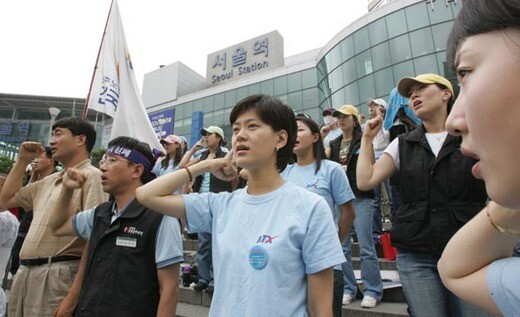hankyoreh
Links to other country sites 다른 나라 사이트 링크
Leading business federations propose worker protections be slashed

Leading members of South Korea’s business community have reportedly proposed that the government lift barriers to make it easier to fire employees and abolish or revise existing systems protecting underprivileged populations, including irregular workers, the elderly, the disabled and women.
Six reports containing proposals written by five leading business federations, including the Federation of Korean Industries, or FKI, and the Korea Employers Federation, or KEF, and submitted to the Ministry of Knowledge and Economy were obtained by The Hankyoreh on April 13.
Among the proposals, the five federations hope to implement regulations allowing companies to dismiss employees at the discretion of company management, with employees given 30 days advance notice instead of the current 50 days. The federations also proposed that when workers go on strike, strikebreakers, which are now permitted only at public institutions, be permitted to cross picket lines not only at public institutions but also at ordinary companies, and requested that preventive and advanced closures be allowed.
The federations also demanded that temporary, or irregular workers should be employed for a period of three years before they are given permanent employment status. The current law stipulates that irregular workers, those without employment contracts, be converted to regular, or contract, status after a period of two years.
The federations also proposed that workers, not companies, be responsible for assuming the burden of proof in discrimination cases, and suggested that allowable claims of discrimination against irregular workers be limited to wage-related issues. The federations requested that the ministry ban some of the activities of trade unions, claiming that unions are more powerful than employers and overprotecting them constitutes reverse discrimination under the law.
The five organizations also demanded that the government be directly responsible for setting the minimum wage, which would override the current method in which the rate is set by a committee of people from the labor community, business community and the government, saying that labor unions could pressure the government into making a decision favorable only to them.
The federations also proposed employing the elderly at rates lower than the minimum wage. Other proposals made by the coalitions were related to regulations on retirement pay and paid vacations.
The FKI and the KEF, in particular, seem to be pushing to curtail maternity leave and programs for the underprivileged. Both organizations remarked that, considering the nation’s economic status and difficult management environment, the reckless strengthening of the maternity protection system could increase the burden on companies and destabilize women’s employment. They also claimed that employees could abuse maternity leave in order to avoid a company’s efforts to reconfigure its employment structure, which is usually accompanied by lay-offs.
The groups also proposed lowering the ratio of disabled employees that a company is legally required to hire. They also urged the government to ease requirements on the obligatory hiring of the family members of those designated as national patriots, saying that employment conditions for the disabled are more necessary.
On April 4, the Knowledge Economy Ministry disclosed a list of 267 proposals made by the five organizations, saying that it conveyed the details to the related ministries and the prime minister’s office.
Lee Eun-mi of the People’s Solidarity for Participatory Democracy, a corporate watchdog, said, “The ministry should disclose the standard used for selecting 267 out of hundreds of items suggested by the business community. It is worrisome that the unreasonable demands of companies could make the government prepare policies to ease regulations.”
Please direct questions or comments to [englishhani@hani.co.kr]
Editorial・opinion
![[Column] Park Geun-hye déjà vu in Yoon Suk-yeol [Column] Park Geun-hye déjà vu in Yoon Suk-yeol](https://flexible.img.hani.co.kr/flexible/normal/500/300/imgdb/original/2024/0424/651713945113788.jpg) [Column] Park Geun-hye déjà vu in Yoon Suk-yeol
[Column] Park Geun-hye déjà vu in Yoon Suk-yeol![[Editorial] New weight of N. Korea’s nuclear threats makes dialogue all the more urgent [Editorial] New weight of N. Korea’s nuclear threats makes dialogue all the more urgent](https://flexible.img.hani.co.kr/flexible/normal/500/300/imgdb/original/2024/0424/7317139454662664.jpg) [Editorial] New weight of N. Korea’s nuclear threats makes dialogue all the more urgent
[Editorial] New weight of N. Korea’s nuclear threats makes dialogue all the more urgent- [Guest essay] The real reason Korea’s new right wants to dub Rhee a founding father
- [Column] ‘Choson’: Is it time we start referring to N. Korea in its own terms?
- [Editorial] Japan’s rewriting of history with Korea has gone too far
- [Column] The president’s questionable capacity for dialogue
- [Column] Are chaebol firms just pizza pies for families to divvy up as they please?
- [Column] Has Korea, too, crossed the Rubicon on China?
- [Correspondent’s column] In Japan’s alliance with US, echoes of its past alliances with UK
- [Editorial] Does Yoon think the Korean public is wrong?
Most viewed articles
- 1‘We must say no’: Seoul defense chief on Korean, USFK involvement in hypothetical Taiwan crisis
- 2N. Korean delegation’s trip to Iran shows how Pyongyang is leveraging ties with Moscow
- 346% of cases of violence against women in Korea perpetrated by intimate partner, study finds
- 4[Column] Park Geun-hye déjà vu in Yoon Suk-yeol
- 5‘Weddingflation’ breaks the bank for Korean couples-to-be
- 6Will NewJeans end up collateral damage in internal feud at K-pop juggernaut Hybe?
- 7Amnesty notes ‘erosion’ of freedom of expression in Korea in annual human rights report
- 8[Interview] Dear Korean men, It’s OK to admit you’re not always strong
- 9Korean government’s compromise plan for medical reform swiftly rejected by doctors
- 10[Editorial] Japan’s rewriting of history with Korea has gone too far